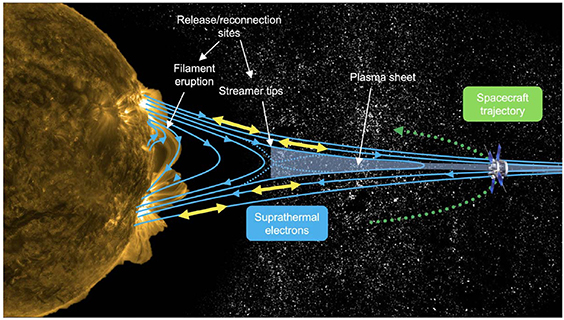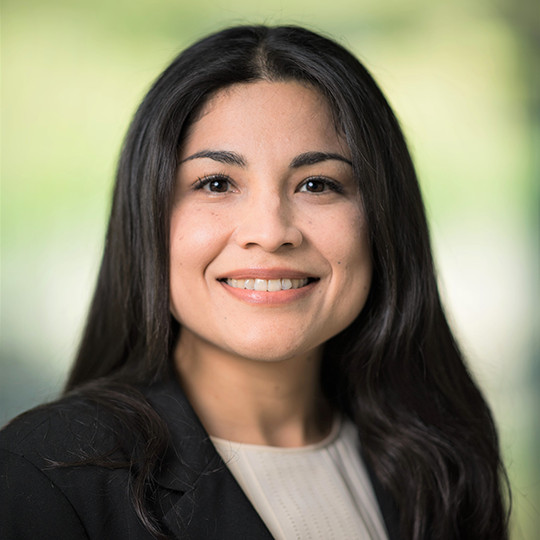
‘Unique Blend’ of Science and Engineering Leads Alumna to Award-Winning Research
Yeimy Rivera receives the Baldwin Prize for making significant contributions to heliophysics research while she was a doctoral student at U-M Climate & Space.

Yeimy Rivera receives the Baldwin Prize for making significant contributions to heliophysics research while she was a doctoral student at U-M Climate & Space.
In honor of making significant contributions to the field, alumna Yeimy Rivera, Ph.D., received the Ralph B. Baldwin Prize in Astrophysics and Space Sciences on May 16, 2022 at the U-M Department of Climate and Space Sciences and Engineering.
The Baldwin Prize is awarded annually to a graduate who has received a University of Michigan Ph.D. during the previous year. To receive the award, scholars must show original and significant contributions to their field as measured by their publications.
During her doctoral program, Rivera worked with faculty co-advisors Professor Enrico Landi, Ph.D., and Professor Susan Lepri, Ph.D. While both faculty are experts in the field of solar and heliophysics, she said they each bring a different focus to their research. Landi focuses on solar spectroscopy that examines light emitted by the Sun, and Lepri works with in situ particle measurements observed locally at a certain point in space.

“Through their complementary expertise and guidance, my doctoral work aimed to bridge these two subfields through modeling and observations,” said Rivera. “As I learned more, I became fascinated with probing the full history of the solar wind beginning with where it came from at the Sun, how it was released and accelerated through the solar atmosphere, and how it evolves throughout the interplanetary medium.”
Rivera’s thesis work became a springboard that launched her into her scientific career and guided her future research interests. As a postdoctoral researcher, she now focuses on answering open questions related to the source and evolution of the solar wind by combining spectroscopy and local plasma measurements.
“Yeimy has been an exceptional student, fully deserving of the Baldwin Prize,” said Landi. “After having had the honor of working with her as my student, I am looking forward to working with her as my colleague.”
Rivera holds a B.S. in Astrophysics from UCLA (2008). She took a break from her studies after completing her bachelor’s degree, before earning a M.A. in Astrophysics with distinction from California State University in 2016, and a Ph.D. in Space Sciences from the University of Michigan in 2020.
When she enrolled in the U-M Department of Climate and Space Sciences and Engineering (CLaSP), she quickly learned she wasn’t the only student who had taken a nontraditional path to a doctorate degree.
“Meeting several others in a similar path was surprising and made me feel a sense of belonging in graduate school because I did not expect to be able to relate to so many other people in that regard,” she said.
Looking back on her educational career, Rivera recalled some of the unique experiences that meant a lot to her as a graduate student. Most notably, she was awarded the Newkirk fellowship from the High Altitude Observatory (HAO), which took her to hubs around the world to join scientists actively study heliophysics.
“Firstly, [the fellowship] enabled me to spend several months with the solar group at the HAO in Boulder, Colorado where I built many professional connections and collaborations,” said Rivera. “Secondly, while at the HAO I was immersed in a lab that builds ground-based telescopes to study the Sun and had the incredible opportunity to join a solar eclipse field expedition to Cerro Tololo in Chile to take measurements of the solar atmosphere during the 2019 solar eclipse.”
Studying science-driven engineering gave Rivera the tools she needed to be successful in astrophysics and space sciences. The department at U-M houses research scientists with a range of expertise that include studying the solar system, as well as building the instruments that measure different regions of space and planetary environments.
“One of the things that struck me as a graduate student in CLaSP was that the department has a unique blend of a science and instrumentation group,” she said. “As a student this was great! This meant that several of my classes on space and plasma physics were taught in the context of the Sun, solar wind, planets, and the instruments launched into space to measure them. This specific focus truly allowed for an in-depth look into these topics that solidified my foundation in space science.”
Now, Rivera works as a postdoctoral fellow at the Center for Astrophysics, which is a collaboration between the Smithsonian Astrophysical Observatory and Harvard College Observatory. She delves deeper into the science every day, helping to engineer exciting new discoveries in solar and heliophysics through her research and building upon exploratory missions into space.
“We have now entered a new era of heliophysics, as missions like Parker Solar Probe (PSP) and Solar Orbiter (SO) reach some of the closest distances to the Sun that make it possible to sample the local solar atmospheric environment,” said Rivera. “These unprecedented measurements of the corona can reveal critical information about how the solar wind forms and makes its way into interplanetary space. I grow very excited as PSP and SO continue to make measurements and new missions join the fleet of current heliospheric observatories that allow us to continue to form a more detailed picture of how the Sun works.”
On top of ground-breaking research, Rivera draws excitement from mentoring undergraduate students. She mentored students through a unique program called Research Experiences for Undergraduates (REU) at the Center for Astrophysics, which is also offered at CLaSP.
“The experience of training, mentoring, and supporting the next generation of scientists is incredibly exciting and rewarding as a scientist,” said Rivera.
Upon her acceptance of the Baldwin Prize, Rivera gave her own presentation on heliophysics entitled ‘Thermal history of prominence eruption derived from ion composition measurements and nonequilibrium charge state modeling.’
“I am excited and honored to be receiving the Baldwin Prize,” said Rivera. “Being recognized for my doctoral thesis work is truly a testament to the excellent guidance and mentoring I received throughout my doctorate.”